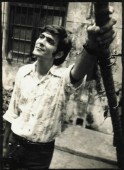Guillermo Rosales: The Halfway House
by Sampsonia Way / December 17, 2012 / No comments
In light of the holiday season, Sampsonia Way asked our Fearless Ink. columnists for three reading recommendations. They chose books that have inspired, influenced, or enriched them and we are publishing an excerpt of one of their suggestions. To see all the recommendations made by the columnists, check the Holiday Recommendations factbox below!
Below is an excerpt from the first chapter of Guillermo Rosales’ novel The Halfway House, recommended by Fearless Ink. columnist Orlando Luis Pardo Lazo. Rosales’ novel had never been available in English until New Directions Publishing Corporation released this version translated by Anna Kushner.
The roof repair la grande or said “boarding home” on the outside, but I knew that it would be my tomb. It was one of those marginal refuges where the desperate and hopeless go—crazy ones for the most part, with a smattering of old people abandoned by their families to die of loneliness so they won’t screw up life for the winners.
- Guillermo Rosales

- Few Cuban writers embodied the paradigm of frustration and brilliance of genius like Guillermo Rosales (Cuba, 1946 – Miami, 1993). Although he destroyed most of his work before committing suicide, The Halfway House survived and was published posthumously. A collection of short stories, Leap Frog, is forthcoming.
“You’ll be fine here,” my aunt says, seated at the wheel of her straight-off-the-assembly-line Chevrolet.
“You’ll understand that nothing more can be done.”
I understand. I’m almost grateful that she found me this hovel to live in so that I don’t need to sleep on benches and in parks, covered in grime and dragging sacks of clothes around.
“Nothing more can be done.”
I understand her. I’ve been admitted to more than three psychiatric wards since I’ve been here, in the city of Miami, where I arrived six months ago, fleeing the culture, music, literature, television, sporting events, history and philosophy of the island of Cuba. I’m not a political exile. I’m a complete exile. Sometimes I think that if I had been born in Brazil, Spain, Venezuela or Scandinavia, I would have also fled those streets, ports and meadows.
“You’ll be fine here,” my aunt says.
I look at her. She gives me a long, hard look. There’s no pity in her dry eyes. We get out of the car. The house said “Boarding Home.” It’s one of those halfway houses that pick up the dregs of society. Beings with empty eyes, dry cheeks, toothless mouths, filthy bodies. I think such places exist only here, in the United States. They’re also known simply as homes.They’re not government-run. They’re private houses that anyone can open as long as he gets a license from the state and completes a paramedic course.
“You’ll be fine here,” my aunt says. “You’ll be among Latinos.”
“. . . a business just like any other,” my aunt explains to me. “A business like a funeral home, an optician’s, a clothing store. You’ll pay three hundred dollars here.”
We opened the door. There they all were: René and Pepe, the two mentally retarded men; Hilda, the decrepit old hag who constantly wets herself; Pino, a gray, silent man who just glares at the horizon with a hard expression; Reyes, an old one-eyed man whose glass eye constantly oozes yellow liquid; Ida, the grande dame come to ruin; Louie, a strong American with greenishyellow skin who constantly howls like a mad wolf; Pedro, an old Indian, perhaps Peruvian, silent witness to the world’s evils; Tato, the homosexual; Napoleon, the midget; and Castaño, a ninety-year-old geezer who can only shout “I want to die! I want to die! I want to die!”
“You’ll be fine here,” my aunt says. “You’ll be among Latinos.”
We go on. Mr. Curbelo, the owner of the Home, is waiting for us at his desk. Did I find him repulsive from the very beginning? I don’t know. He was fat and shapeless, and was wearing a ridiculous track suit made all the worse by a juvenile baseball cap.
- Pardo’s Recommendations

- Holiday Recommendations
- –The Halfway House by Guillermo Rosales
- –Havana, Beyond the Ruins edited by Anke Birkenmaier and Esther Whitfield
- –Steve Jobs by Walter Isaacson
- Orlando Luis Pardo Lazo was born in Havana City and still resides and resists there, working as a free-lance writer, photographer and blogger. He is the author of Boring Home (2009) and is the editor of the independent opinion and literary e-zine Voces.
“Is this the man?” He asks my aunt with a smile on his face.
“This is him,” she responds.
“He’ll be fine here,” Curbelo says, “like he’s living with family.”
He looks at the book I’m carrying under my arm and asks, “Do you like to read?”
My aunt responds, “Not only that. He’s a writer.”
“Ah!” Curbelo says with mock surprise. “And what do you write?”
“Bullshit,” I say softly.
Then Curbelo asks, “Did you bring his medicines?”
My aunt looks in her purse.
“Yes,” she says. “Melleril. One hundred milligrams. He has to take four a day.”
“Good.” Mr. Curbelo says with a satisfied face.
“You can leave him then. We’ll take care of everything else.”
My aunt turns to look into my eyes. This time, I think I see the slightest trace of pity. “You’ll be fine here,” she assures me. “Nothing more can be done.”
My name is William Figueras, and by the age of fifteen I had read the great Proust, Hesse, Joyce, Miller, Mann. They were for me what saints are to a devout Christian. Twenty years ago, I finished writing a novel in Cuba that told a love story. It was the story of an affair between a communist and a member of the bourgeoisie, and ended with both of them committing suicide. The novel was never published and my love story was never known by the public at large. The government’s literary specialists said my novel was morose, pornographic, and also irreverent, because it dealt harshly with the Communist Party. After that, I went crazy. I began to see devils on the walls, to hear voices that insulted me—and I stopped writing. All I produced was a rabid dog’s froth. One day, thinking that a change of country would save me from madness, I left Cuba and arrived in this great American country.
Excerpt from The Halfway House, by Guillermo Rosales. Translated by Anna Kushner. Copyright 2009 by the Heirs of Guillermo Rosales. Translation Copyright 2009 by Anna Kushner. Used by permission of New Direction Publishing Corporation. All rights reserved.





